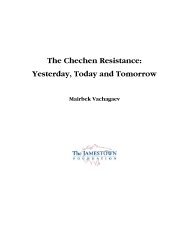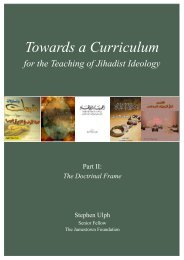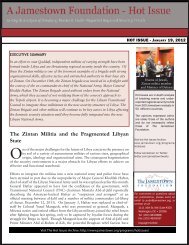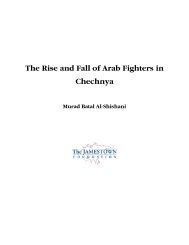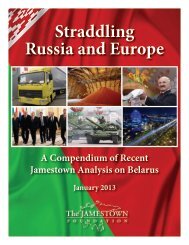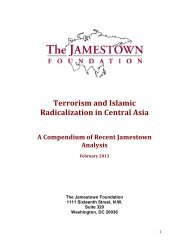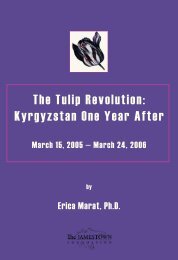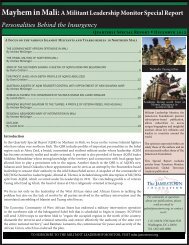ChinaBrief In a Fortnight - The Jamestown Foundation
ChinaBrief In a Fortnight - The Jamestown Foundation
ChinaBrief In a Fortnight - The Jamestown Foundation
Create successful ePaper yourself
Turn your PDF publications into a flip-book with our unique Google optimized e-Paper software.
<strong>ChinaBrief</strong> Volume XII s Issue 21 s November 6, 2012<br />
to establish official ties with Beijing.<br />
Since then, China increasingly has seen Brunei as a useful<br />
source of oil and gas to fuel its economic growth and a<br />
voice for better ties between it and ASEAN. Meanwhile,<br />
Brunei, an Islamic sultanate with a population of 400,000<br />
and the fifth richest country in the world per capita,<br />
has considered Beijing to be a crucial partner to engage<br />
to both diversify and strengthen its fossil-fuel-based<br />
economy and preserve peace and stability in the Asia-<br />
Pacific region.<br />
While relations between the two countries have tightened<br />
over the last decade or so, the last year has seen a<br />
particular increase in the momentum of the relationship<br />
ahead of Brunei’s chairmanship of ASEAN in 2013. Last<br />
November, Wen Jiabao became the first Chinese premier<br />
to visit Brunei in the history of the bilateral relationship,<br />
and both sides celebrated the 20th anniversary of<br />
the establishment of diplomatic relations with great<br />
fanfare. Wen’s visit began what the Brunei Times called<br />
“a whole new chapter” in Sino-Brunei relations (Brunei<br />
Times, November 23, 2011). This year, the chairman of<br />
the Chinese People’s Political Consultative Conference<br />
(CPPCC) Jia Qinglin paid the first visit of its kind to<br />
Brunei in April, and Chinese Foreign Minister Yang Jiechi<br />
also visited in August (Xinhua, August 11; People’s Daily,<br />
April 20). Top officials also have met on the sidelines of<br />
key meetings, as Chinese President Hu Jintao and Brunei’s<br />
Sultan Hassanal Bolkiah most recently did at APEC.<br />
Commercial relations have strengthened considerably,<br />
as well. Trade in 2011 soared to $1.3 billion, nearly four<br />
times what it was in 2008 and surpassing the $1 billion<br />
target set by the two countries previously (Minister of<br />
Foreign Affairs and Trade, Brunei Darussalam, 2012).<br />
<strong>The</strong> bulk of that is in energy, which is not surprising<br />
since Beijing needs to fuel its rapid growth while Brunei is<br />
Southeast Asia’s third largest oil exporter and the world’s<br />
fourth largest natural gas exporter. Soon after Wen’s<br />
visit to Brunei in 2011, for example, Brunei agreed to<br />
increase oil exports to China from 13,000 barrels per day<br />
to 16,000 barrels per day. Meanwhile, China’s National<br />
Offshore Oil Corp (CNOOC) has inked a deal with<br />
Petroleum Brunei for oil and gas commercial exploration,<br />
while Zhejiang Henyi Group and Sinopec Engineering<br />
<strong>In</strong>c. currently are working to help develop an oil refinery<br />
and aromatic cracker plant in Brunei to boost the energy<br />
8<br />
sector in the largest ever foreign direct investment in the<br />
country (China Daily, July 19).<br />
Both sides increasingly have tried to broaden the reach of<br />
their cooperation beyond energy. Within the economic<br />
realm, the two countries signed a Memorandum of<br />
Understanding (MoU) to boost cooperation in agriculture<br />
in April. Apart from increased trade, the MoU also included<br />
more joint efforts in human resource development<br />
and providing training for government officials and<br />
professional technical personnel (Brunei Times, April 20).<br />
Both sides have tried to encourage greater investment<br />
and private sector interaction. Beijing has signaled that<br />
it would like small and medium enterprises (SMEs) from<br />
Brunei to invest in “lesser developed” parts of China,<br />
while Bandar Seri Begawan has tried to get Beijing to<br />
broaden its range of investments in the country through<br />
a range of trade fairs, expositions and symposiums. A<br />
recent National Chamber of Commerce and <strong>In</strong>dustry<br />
(NCCI) meeting in Brunei, for instance, saw a Chinese<br />
delegation comprising government representatives from<br />
various industries including real estate, construction,<br />
medicine, and gem and jade (Brunei Times, October 26).<br />
Cooperation also has been recently extended to the city<br />
level, with Nanjing and Bandar Seri Begawan becoming<br />
sister cities last year—an arrangement that is expected to<br />
boost tourism and cultural activities.<br />
China and Brunei also continue to place a great emphasis<br />
on people-to-people ties, which CPPCC Chairman Jia<br />
Qinglin singled out as one of the four ways to enhance<br />
bilateral cooperation during his visit earlier this year<br />
(Xinhua, April 20). For Brunei, the main focus is on<br />
tourism because aside from its ASEAN neighbors, China<br />
brings the most tourists into Brunei (Brunei Times, June<br />
8). Beijing and Bandar Seri Begawan have also both been<br />
paying increasing attention to the role of youth in bilateral<br />
ties. Chinese youth groups have paid visits to Brunei, and<br />
the Universiti Brunei Darussalam and Zhejiang University<br />
forged an official partnership in July this year, initiatives<br />
that not only cement inter-generational ties between the<br />
two nations, but also potentially could provide Brunei<br />
with young investors or graduates interested in working<br />
or doing business there (Xinhua, July 20; Brunei Times,<br />
April 24, 2011). <strong>The</strong> ceremonial dimension of peopleto-people<br />
ties also should not be overlooked. China<br />
continues to invest a great deal in emphasizing the rich<br />
history of the relationship, promoting the China-Brunei



